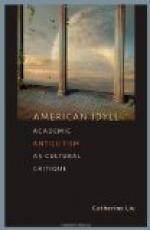There was the gay, glad party that the Economic students gave, out in Handschusheim at the “zum Bachlenz”; first, the banquet, with a big roomful of jovial young Germans; then the play, in which Carl and I both took part. Carl appeared in a mixture of his Idaho outfit and a German peasant’s costume, beating a large drum. He represented “Materialindex,” and called out loudly, “Ich bitte mich nicht zu vergessen. Ich bin auch da.” I was “Methode,” which nobody wanted to claim; whereat I wept. I am looking at the flashlight picture of us all at this moment. Then came the dancing, and then at about four o’clock the walk home in the moonlight, by the old castle ruin in Handschusheim, singing the German student-songs.
There was Carnival season, with its masque balls and frivolity, and Faschings Dienstag, when Hauptstrasse was given over to merriment all afternoon, every one trailing up and down the middle of the street masked, and in fantastic costume, throwing confetti and tooting horns, Carl and I tooting with the rest.
As time went on, we came to have one little group of nine students whom we were with more than any others. As each of the men took his degree, he gave a party to the rest of us to celebrate it, every one trying to outdo the other in fun. Besides these most important degree celebrations, there were less dazzling affairs, such as birthday parties, dinners, or afternoon coffee in honor of visiting German parents, or merely meeting together in our favorite cafe after a Socialist lecture or a Max Reger concert. In addition to such functions, Carl and I had our Wednesday night spree just by ourselves, when every week we met after his seminar. Our budget allowed just twelve and a half cents an evening for both of us. I put up a supper at home, and in good weather we ate down by the river or in some park. When it rained and was cold, we sat in a corner of the third-class waiting-room by the stove, watching the people coming and going in the station. Then, for dessert, we went every Wednesday to Tante’s Conditorei, where, for two and a half cents apiece, we got a large slice of a special brand of the most divine cake ever baked. Then, for two and a half cents, we saw the movies—at a reduced rate because we presented a certain number of street-car transfers along with the cash, and then had to sit in the first three rows. But you see, we used to remark, we have to sit so far away at the opera, it’s good to get up close at something! Those were real movies—no danger of running into a night-long Robert W. Chambers scenario. It was in the days before such developments. Then across the street was an “Automat,” and there, for a cent and a quarter apiece, we could hold a glass under a little spigot, press a button, and get—refreshments. Then we walked home.
O Heidelberg—I love your every tree, every stone, every blade of grass!
But at last our year came to an end. We left the town in a bower of fruit-blossoms, as we had found it. Our dear, most faithful friends, the Kecks, gave us a farewell luncheon; and with babies, bundles, and baggage, we were off.




